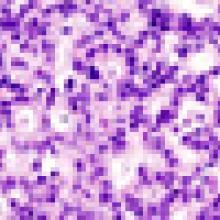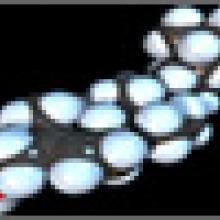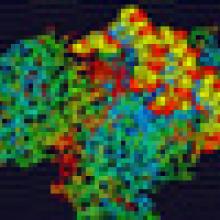Newsroom
5/9/2011
About 90 percent of cancer deaths are due to the spread (metastasis) of the cancer from its original site to distant locations in the body. The movement of cancer cells is assisted by foot-like projects called invadopodia. These cell extensions have destructive enzymes on their surface (MMP), and… more
5/9/2011
Globally, cervical cancer is a leading causes of cancer death, killing almost 300,000 women yearly. New research shows that a commonly used HIV/AIDS drug, lopinavir, can kill cervical cancer cells and non-cancerous HPV immortalized cells. The identification of an approved drug that can kill pre-… more
5/6/2011
Due to better cancer detection, diagnsosis and treatment, the number of cancer survivors in the U.S. continues to increase. As of 2007, there were approximately 11.7 million cancer survivors in the U.S. According to a report from the Centers for Disease Control and Prevention, "As of January 1,… more
5/6/2011
Glioblastoma multiforme (GBM) is the most common form of primary brain cancer. Every year, approximately 19,000 people are diagnosed with brain cancer. GBM is particularly difficult because it is resistant to many standard treatments, which include chemotherapy, radiation, and surgery. The Food and… more
5/3/2011
Correctly staging cancer is key to making the right treatment decisions. Unfortunately, there is always some variation introduced by human interpretation of tissue samples. Scientists in Canada have developed a new way to help stage breast cancer that uses fractal geometry and computer analysis… more
5/2/2011
A study from researchers at the Fox Chase Cancer Center has produced some of the strongest evidence yet that aspirin can impact the development/recurrence of cancer. In the study, the researchers followed about 2000 prostate cancer patients for 10 years after their treatment. Those patients that… more
5/2/2011
Mesothelioma, a cancer frequently associated with exposure to asbestos, is difficult to treat. The cancer often resists traditional chemotherapy and radiation. A new study has shown that a drug targeted at the mTOR kinase, temsirolimus (Toricel), has good activity againt mesothelioma. Both in… more
4/27/2011
Ohio State University researchers are using supercomputers to help find cures for cancer. In particular, the researchers are looking at blocking the activity of a naturally occuring protein, interleukin 6 (IL-6). This protein is normally produced by cells of the immune system but in cancer, it is… more
4/27/2011
Researchers at Penn State University have developed a chemical that seems to be able to prevent melanoma development. Starting with a natural chemical (isothiocyanate), the researchers modified the structure to make it more potent. They then tested the chemical in two different model systems, one… more
4/25/2011
In 2011, the Food and Drug Administration (FDA) approved two new anti-melanoma therapies: ipilimumab and peginterferon alfa-2b.
Ipilimumab (Yervoy®) is an injection used to treat melanoma that cannot be removed by surgery (unresectable) or melanoma that has spread to other parts of the body (… more
4/25/2011
Because most people are non-smokers or former smokers, a study of non-smoking individuals was performed to see how they fared in relation to cancer and other disorders. A fourteen year follow-up of almost 112,000 participants in a cancer prevention study showed that those individuals who followed… more
4/25/2011
Women with mutations in the BRCA genes, which encode proteins that repair DNA damage, are at an increased risk of developing breast cancer. For this reason, it is necessary to very carefully monitor these women, to detect cancer at its earliest stages. A recent article in the Journal of Clinical… more
4/21/2011
Tumors need blood in order to survive; blood provides nutrients critical for growth and proliferation. For this reason many cancer treatments have been developed to target blood vessel growth (angiogenesis). Unfortunately, the available drugs are only partially effective.
Researchers from… more
4/21/2011
Pancreatitis, or inflammation of the pancreas, is a known risk factor for a type of cancer called pancreatic ductal adenocarcinoma (PDA). The ways that inflammation help cause PDA have only recently begun to be identified. The inflammatory mediator Stat3, a protein that works to increase the… more
4/21/2011
Over the years, as new information has been acquired, the public perception of cholesterol has changed. In the past, many people viewed all cholesterol as 'bad'. Then there arose the idea of "good cholesterol" and "bad cholesterol." The former describes high-density lipoprotein (HDL), and the… more
4/20/2011
The p53 protein is a well known and studied tumor suppressor. The gene is mutated in over 50% of cancers, highlighting its importance in cancer prevention. A new study has demonstrated a role for p53 in the suppresion of metastasis.
When a group of Israeli researchers inactivated CKIα, a… more
4/20/2011
A report from the American Assocation of Cancer Research details the effectivenes of the experimental skin cancer drug vismodegib. The drug targets a pathway known as 'Hedgehog'. This processes controlled by Hedgehog are important in development and the inhibitor is targeted at Smoothened, a… more
4/20/2011
Hypericin is a chemical found in St. John's Wort, the common medicinal herb. Hypericin has been shown to have anti-viral activity and been investigated for its potential use as a treatment for HIV-infected individuals.
A clinical trial of hypericin in recurrent brain cancer showed that the… more
4/19/2011
Omega-3 fish oil was shown to boost the effectiveness of tamoxifen in a rat model of breast cancer. The oil seemed to boost the activity of gene associated with cell differentiation, a sign of decreased aggressiveness for cancer cells. The oil also increased the expression of genes related to… more
4/19/2011
The use of prostate specific antigen (PSA) tests to screen men for prostate cancer is controversial. In large part this is because the test can yield indicate that patients have cancer when they do not. This result is called a false positive. Also, the cancers that are detected by biopsies… more




















